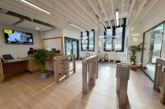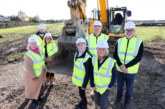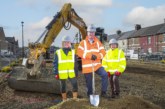A skills shortage in four key jobs — coupled with three key sector challenges — have been identified in a review of the skills required to decarbonise UK homes for net zero.
The report, Foresighting Skills for Net Zero, by the net zero innovation centre Energy Systems Catapult and funded by the Gatsby Foundation, found the UK education system and the wider sector were “underprepared for this retrofit revolution”.
The review found that the emerging net zero home retrofit market needed to decarbonise eight homes every minute for the next 29 years[i] in order for the UK to achieve its ambition of net zero carbon emissions by 2050. This required “substantial growth and change within the supply chain to meet the challenge of quality, scale and complexity within a relatively short time frame”.
In the short-term, there was skills gaps that needed prioritising to build a sustainable market and help address existing latent demand, including roles in:
- Property assessment
- Advice and customer care
- Low carbon heating installation
- Technology integration
In the medium-term, the research identified three key challenges that the sector must address to develop the, stimulate demand, and increase capacity and skills provision, across the supply chain:
- Consumer Confidence and Trust
- Quality and Governance
- Integration
The review found the educational system and the wider sector is underprepared for this retrofit revolution. Higher Education and Further Education curricula focus almost entirely on new-build and fossil-fuel burning technologies, to the detriment of retrofit and low carbon technologies. This challenge must be addressed collaboratively, building on existing best practice, identifying gaps and bringing together different elements of the supply chain to create joined up solutions that will work for customers and businesses alike.
Geraldine Newton-Cross, Commercial Director at Energy Systems Catapult, said: “Decarbonising our homes is an urgent challenge. If consumers are to welcome changes to their heating systems at the pace required to meet our carbon budget, they need professionals who can hold their hand as they retrofit their homes, not just provide piecemeal recommendations about favoured technologies.”
“Consumers need support to understand the cost and performance trade-offs of different approaches. This requires a new approach to be adopted across the energy services sector – requiring new jobs and new skills, including in digital technologies and data — to implement decarbonisation measures at the pace and scale demanded.”
As part of an Energy Systems Catapult project exploring net zero skills and training, the Gatsby Foundation funded research to map existing skills provision, highlight gaps and identify skills requirements for the future home retrofit marketplace.
Geraldine continued: “Energy Systems Catapult, with the support of The Gatsby Foundation, aims to support the sector in making this transition by: mapping the new roles required for home decarbonisation; identifying emerging skills gaps; qualifying the occupational standards required; and developing potential curricula suitable for training the incumbent workforce. This will help inspire the next generation of engineers and heating experts we need to make it easy for consumers to switch to low carbon.
“No other sector of the economy has the potential to accelerate the net zero ambition and create the same volume of high-quality jobs as the decarbonisation of our homes.”
In addition to highlighting several skills gaps in the home retrofit sector, the research also identified the need for wider activities to address structural issues:
- Improving quality assurance and monitoring of installs to drive improvements in installation and training, as well as increasing customer confidence in the supply chain
- Focusing on customer care and experience, in particular provision of good-quality advice and information to customers to enable them to make decisions confidently
- Making better use of data to provide more detailed and meaningful property assessments, and to highlight performance gaps after installation has taken place
- Identifying ways of integrating a fragmented supply chain better, increasing knowledge sharing and collaboration to help promote good practice and develop offers that customers will find attractive.
Daniel Sandford Smith, Director of Programmes at Gatsby Charitable Foundation, said: “There is no doubt that we need to do more to improve the energy efficiency of our existing housing stock. We welcome this report from Energy Systems Catapult which is the first step in the journey to identifying the skills that will be needed to create a retrofit revolution.”
Energy Systems Catapult has been commissioned by the Gatsby Charitable Foundation to continue this important work with the next phase of foresighting, which will focus on working with key stakeholders within the retrofit sector, identifying the top priority skills and roles required for the acceleration of retrofit, and the exploration of future scenarios to identify solutions to these key challenges.
The Foresighting Skills for Net Zero report is available to download here.
[i] Based on a 40-hour working week, we will need to decarbonise around eight homes every minute for the next 29 years to help the UK achieve its ambition of Net Zero carbon emissions by 2050.









